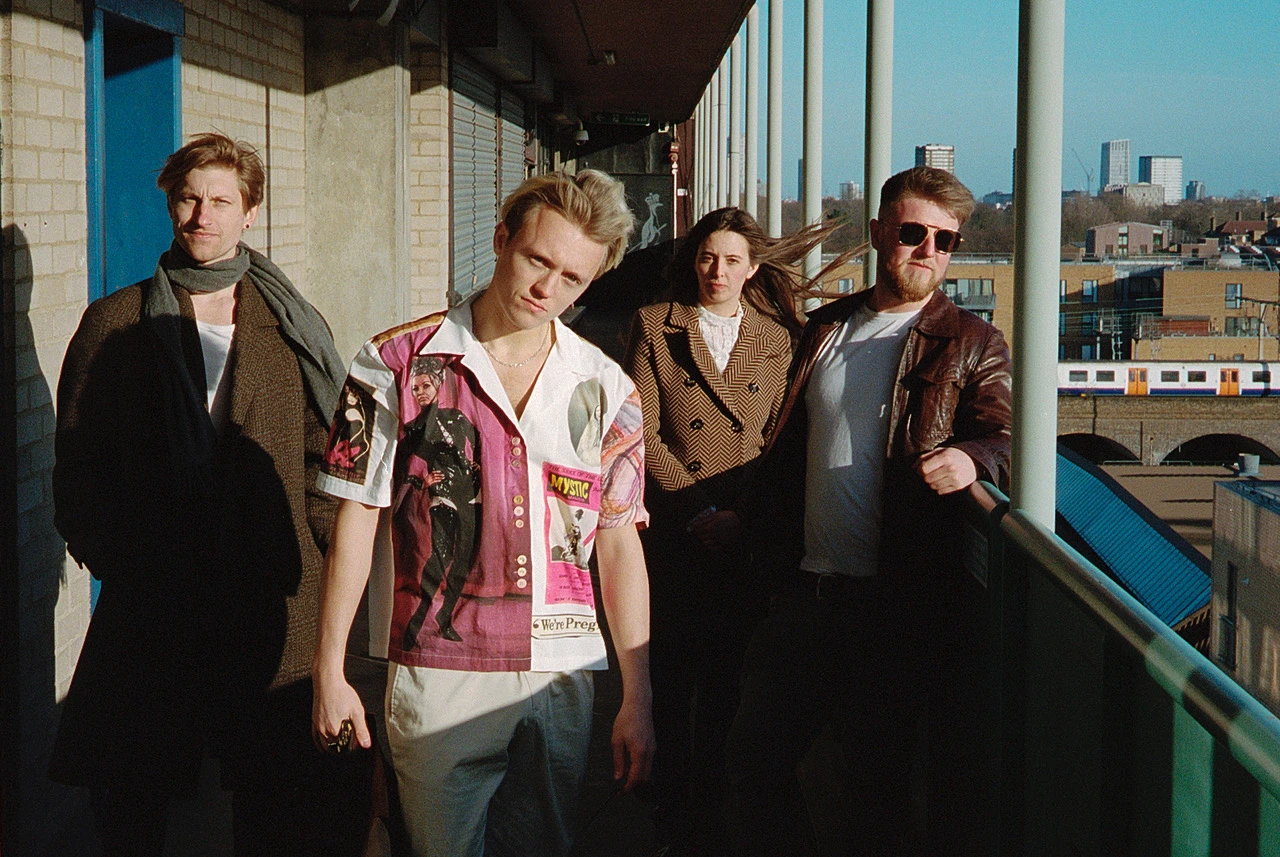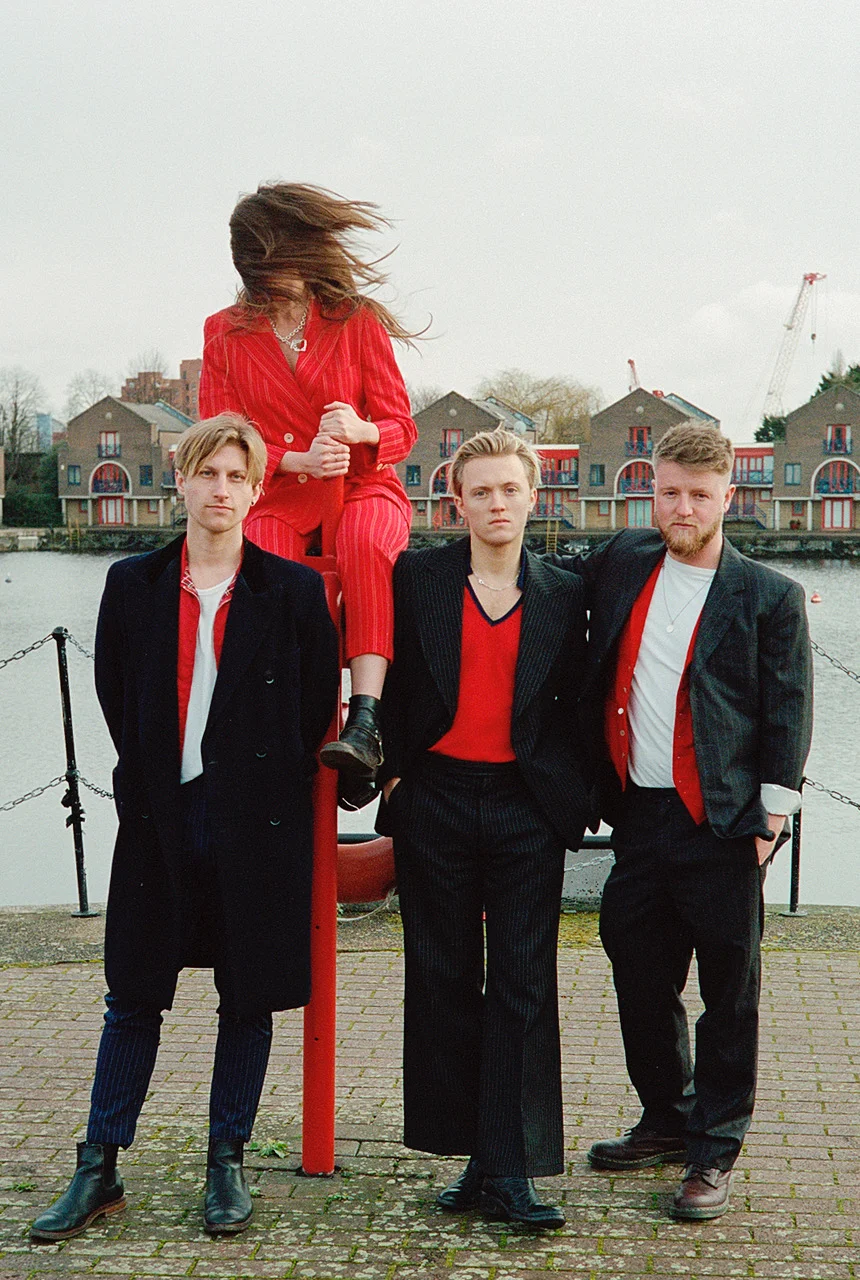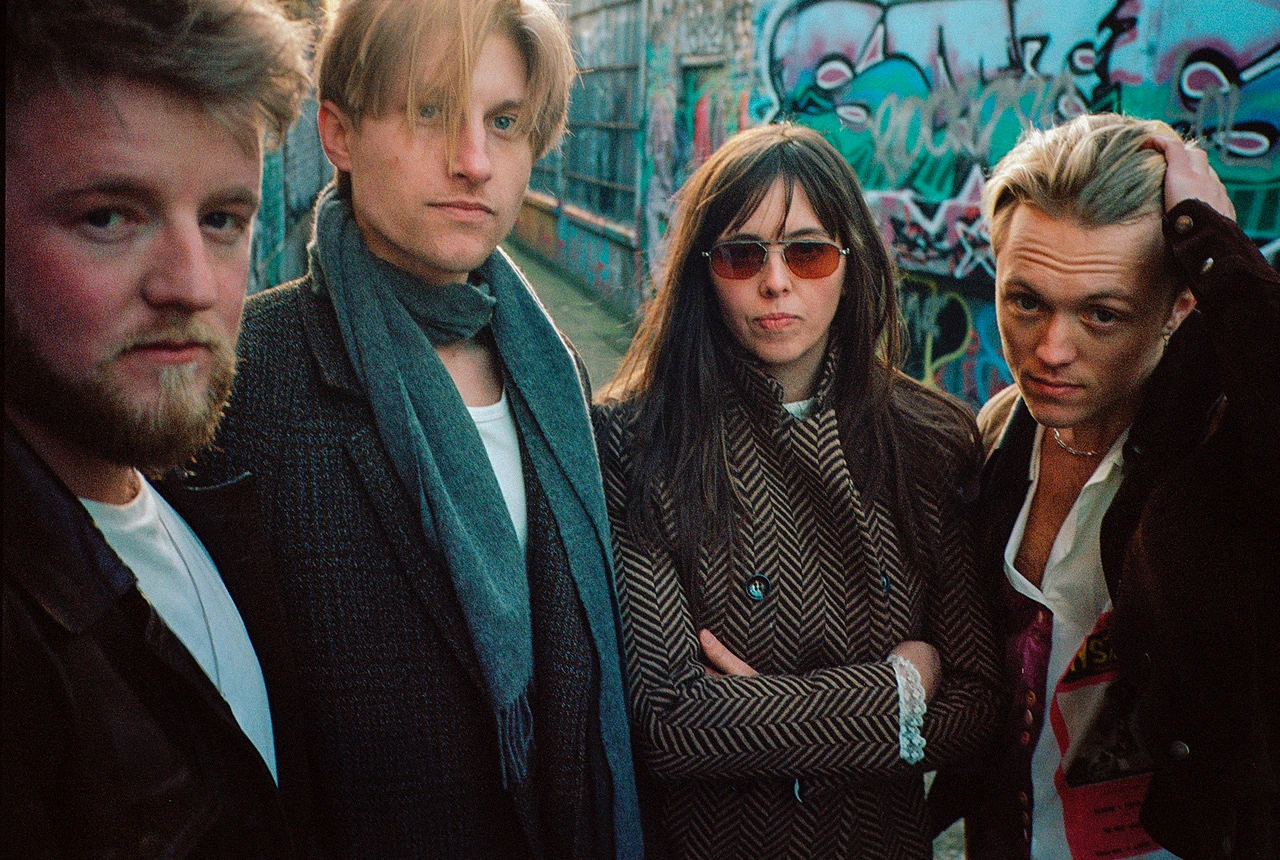Khartoum: Modern Problems Require Modern Musicians
Finding artistic confidence in a world constantly pumping out content, whether that be in the form of musical or visual art, is becoming an increasingly difficult endeavour. Indeed, it feels harder than ever to discover anything unique in a world where it seems it's all been done before.
In this way, London rock foursome Khartoum's ability to define themselves despite their relatively narrow oeuvre makes them all the more interesting.
Locating themselves firmly within their unique take on politics and aesthetics - both visual and, more importantly, musical - Khartoum has already created somewhat of a persona for themselves. Having played on the catwalks of Each x Other and even the stages of Glastonbury, for an up-and-coming band, they have a built up a resume that competes with many an established ensemble.
Interested in seeing how Khartoum has explored their musical capabilities and aesthetic principles, Radio Monash sat down Oscar and Cam. What followed was a conversation about what it means to be a band making themselves in London during these uncertain times.
How’ve you guys been during this pandemic?
Cam: "We’ve been quite productive, which is cool. We’re going to be playing some of these new songs that we’ve had a chance to fully finish off tonight actually. We’re having our first gig in the last six months. We got a deal signed. We started releasing music and Oscar filmed a music video he is just finishing off the editing on which we are very proud of."
Oscar: "I think it’s been tough. I live in London and so does Cam. It’s been pretty intense. [With our government], they aren’t looking after the arts or supporting venues."
C: "Financially, it’s pretty terrible."
O: "We have been staying creative and writing. Luckily, just before lockdown had happened we had recorded our music. We had these songs ready to go and we had managed to get the music videos including the one for ['New Cold War'] alongside a few other things done. It’s been tough but there’s been some positives."
How did you guys meet and form Khartoum?
O: "That’s a good story. Cam and I were at boarding school together. We were dorm mates. I wasn’t really interested in playing music at that point in my life..."
C: "I was always playing music, but we only collaborated making stupid songs about Ribena and shit like that. We weren’t actually writing any songs. Then I went to Uni and Oscar went off to New York to drama school and came back to London after that.
Once we met up again it just fell into place. It was just us for a while for a couple of years then we got Jake in. I went to Uni and studied music with him. Then Oscar met Scarlet in a field somewhere. I’m not sure how that one happened actually."
O: "Pretty much, I was at a rave. It was a small mini festival and Scarlet was there. We got to speaking about music and she said she was a drummer and she just so happened to fit as a piece of our jigsaw. We played our first gig two and a half years ago and we’ve just been developing ever since. We are quite lucky because we have a residency at this place called Laylo and we get to play there. We played consecutively, like twenty shows, there and that’s been really helpful to learn how to play live."
C: "It’s a great way to hone the craft, see what works and what doesn’t. You can feel what’s good when you know the venue and the crowd - obviously the crowd is changing, but the interaction is key."
O: "We were allowed to pick our own supporting bands and got to help with choosing the bands we got to play with. They are really fun nights, we try to make them that way. They are quite eclectic and raucous, they end up becoming quite a party."
Your Spotify bio mentions you had a residency at Laylo, a place renowned for having Mick Jagger play with the Stones. How does it feel knowing you’re playing in a place that has such a historical pedigree tied to it?
O: "There’s a venue called the Troubadour that’s nearby and we’ve played there too a bunch of times and that’s had Led Zeppelin. There’s a lot of venues in London, in the same way they are in Melbourne with venues that have had amazing Australian artists. It’s nice to play in these spaces that these people have played at. You’re getting closer to where you want to be."
C: "I think you’re underplaying it a bit there Oscar. Let me tell you what happened… what really happened.
At Laylo we were playing a show and we didn’t see him at the time, but someone came up to us at the end and were like:
‘Oh look, Mick Jagger was here, he was actually watching you guys and filming you on his phone’. We were like, what the fuck.
It then transpired he actually - I’m not sure how exactly this happened - but the Stones played some shows in Wembley a couple of weeks later. They had an after-party. After having seen us play, Mick Jagger had actually booked us to play the after-party which was insane. That was mad. Getting that kind of recognition from them- it was pretty mind-blowing. It felt like a dream."
O: It was a bit of a strange gig, because it was like more of a private party. I remember looking up and Woody Harrelson was just right there, and I was in shock. I love True Detective and I just love Woody Harrelson so seeing him dancing along was sort of surreal."
C: "Just playing for those kinds of occasions and in these types of venues it really is sort of surreal."
So, the name Khartoum comes from the horse in The Godfather. You guys mentioned you are interested in drama and film - when it comes to the creation of your music, do you look to film as a source of inspiration?
O: "That’s a good question. I think so. Cam sent me one song named 'Modern Make Believe', he did the music for it. It struck a chord with me and for me. It made think of a film that can be found in suburbia. What’s that film with Kevin Spacey?"
C: "American Beauty."
O: "Yes, American Beauty. I look at music and just see it sometimes. God, this sounds so pretentious. You can hear a piece of music and you can visualise the scenario. I watch too many films. I would be far more productive if I stopped watching so many films, I’m always watching. Our next music video looks amazing and I hope the ones after that look even more cinematic. The one you’ll see is what I want to do more of. We’ve got an actress in it who is actually my mum so that’s going to be amazing cool."
C: "When I give Oscar a piece of music and he is writing the lyrics to it, he will often say, "Alright, I am visualising a character". It’s sort of like how David Bowie did the persona thing, however, Oscar does it per song. It’s not necessarily that the lyrics are coming straight from the heart of us, sometimes it’s that persona that might be inspired by a film we’ve seen."
With so many up-and-coming bands, what do you guys feel makes you guys different?
O: "I don’t think we try to fit into any boxes. A lot of the bands that are coming out of London at the moment are doing this post-punk thing. They shout their lyrics and try to fit into this mould. It may be a little harsh, but that’s what I think."
C: "I think we strive to not have that. It’s all about whether or not it feels good. If it feels like we are doing something for the sake of fitting in, then there’s no point in doing it."
O: "We are doing our own thing not trying to be particularly like anyone. Obviously, we have influences and inspiration with bands that inspire us, but we hope we are creating something different. There are quite a few scenes in London and I think we move in and out of them, but we never stick to any particular one. When we play a set list the songs are quite different. We like to experiment with our own sounds because overall this willingness to be different can create something new. Some of our favourite artists are people that really experimented - like Bowie, for example."
You bring up David Bowie, who was infamous for his fashion as well as his music. Recently, you played Each x Other’s fashion show - does your fashion influence the way you create your aesthetic?
O: "I think it does. The jagged shapes of a suit reminds me of David Byrne and the Talking Heads. I look at the object. It reminds me of Stop Making Sense, his great film.
When I get dressed up, I feel kind of like a different person, or a different Oscar. When you get on stage and put on your outfit, you embody a character. I think it does influence me, definitely. We’ve got lots of friends, some being designers, who make clothes. Shapes create an emotion and an association. Shapes, cuts and textures are similar to how film, music and fashion work together to create something unique. It should be a whole thing. I look for that in a band with the whole visual experience. That’s thing when it comes to an identity: not everyone has to wear suits and all of that to create a spectacle, they’ve just got to be unique."
C: "The fashion side of things obviously influences the way we look in a big way. If you look good, you feel good and you play good. Obviously, you can’t see us when you’re listening to us on your headphones and see what we’re wearing. For the videos and the photographs and things it’s important for us to look our best."
O: It’s the same with Nick Cave with his black suit at the piano. You see him, and you sort of know what you’re going to get into from a photograph. He looks like his music. I think if you can do that it’s really cool. If you look at Die Antwoord, they look like their music. I really like that.
You played at Glastonbury, how was that for you guys? Were there any interesting experiences that came out of it?
O: "Yes, there were loads. Tame Impala was mind-blowing. It was the first time I’d seen Tame Impala. Their light show was fantastic. You probably want to hear about our show, but their show was amazing.
Scarlet, our drummer, for the past couple of years has run a café in Strummerville which is right at the top of the map. She had us, Cam, myself and Jake, working in the kitchen, flipping burgers and frying bacon. It was the hottest Glastonbury in the last fifteen years, it was tough. I don’t know if you’ve fried bacon at 1pm on a hot day, but it’s quite intense. We got there on the Monday and our gig was on Sunday night at 1am. So, we had a full week of working at Glastonbury before we had even performed. It was tough and tiring but also the most exhilarating week of my life. We were sad to miss it this year; we hope to play it again."
Khartoum was recently shouted out by Marianne Faithful, all-round icon of the sixties and seventies. How does it feel to be supported by such a well-known cultural figure?
O: "She’s actually my grandmother. What I did was basically go, 'Hey granny, can you give us a shout-out?'. Hopefully she does genuinely like our music. I would like to think so. I would be lying to you if I didn’t say that I asked for a little shout-out. She’s great, she’s very supportive of the band. I think she has a love interest in Cam. If she were younger, Cam and her would be well… she loves the whole band. She’s cool, she’s a cool girl. Unfortunately, she got quite sick during lockdown with the coronavirus, but she’s better than ever now. I always think at the end of the world once the bombs fall and we get wiped out, it’ll be her and Keith Richards at the end of it all. That being said, we are open to any support so if she can help us with the shout-out it’s great.
We’ve got some way to go of course, but it’s a good starting hand."
What kind of emotion or concept are you hoping to instil in people when they listen to your work?
O: "('New Cold War') does have a rather succinct message to it. It’s talking about climate change and our position in the world. Have you heard of Extinction Rebellion?"
Yeah, I have.
O: "It’s all over the world. The first time we performed it was at an Extinction Rebellion blockade in London. We support that cause with all our hearts and have been behind it for a long time. We often say either through social media or our gigs the movements we support. I feel like there are some bands like Idles that really commit to politics.
I think that the world is so fucked up at the moment that everyone should be writing punk music.
Not all our music is political though. We have a song at the moment called 'Nothing to Declare' which is just about being stuck in lockdown and looking at the world outside. We hope people just enjoy it and dig it. Our song ['New Cold War') is about when Cambridge Analytica harvested the information from people online and about the high school shootings that happened in America last year."
C: "The songs differ in their message from song to song. When I hear a piece of music and my body reacts to it, that’s a good sign. When you get the shiver up the spine and the goose bumps that’s a good sign. If our songs are doing that to people, then that’s the ultimate end result. That, of course, is one side of it. Because then lyrically, of course, they need to have something to say. If people discuss the lyrics, then that’s just as important."
O: "We spoke earlier about music can paint a picture. When people listen to our music, we hope it gives them that kind of experience. If it allows their imagination flow, then we like that."


